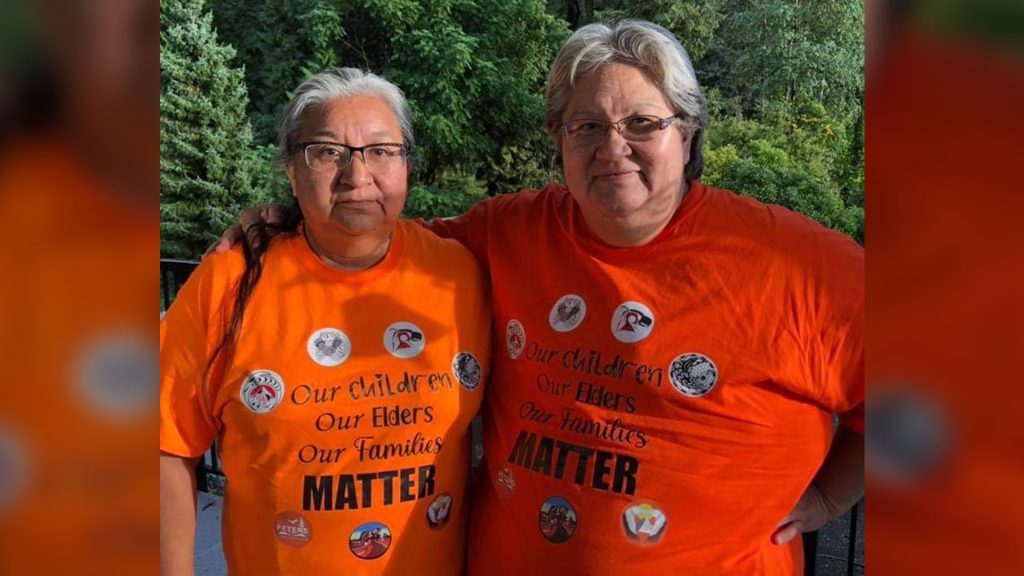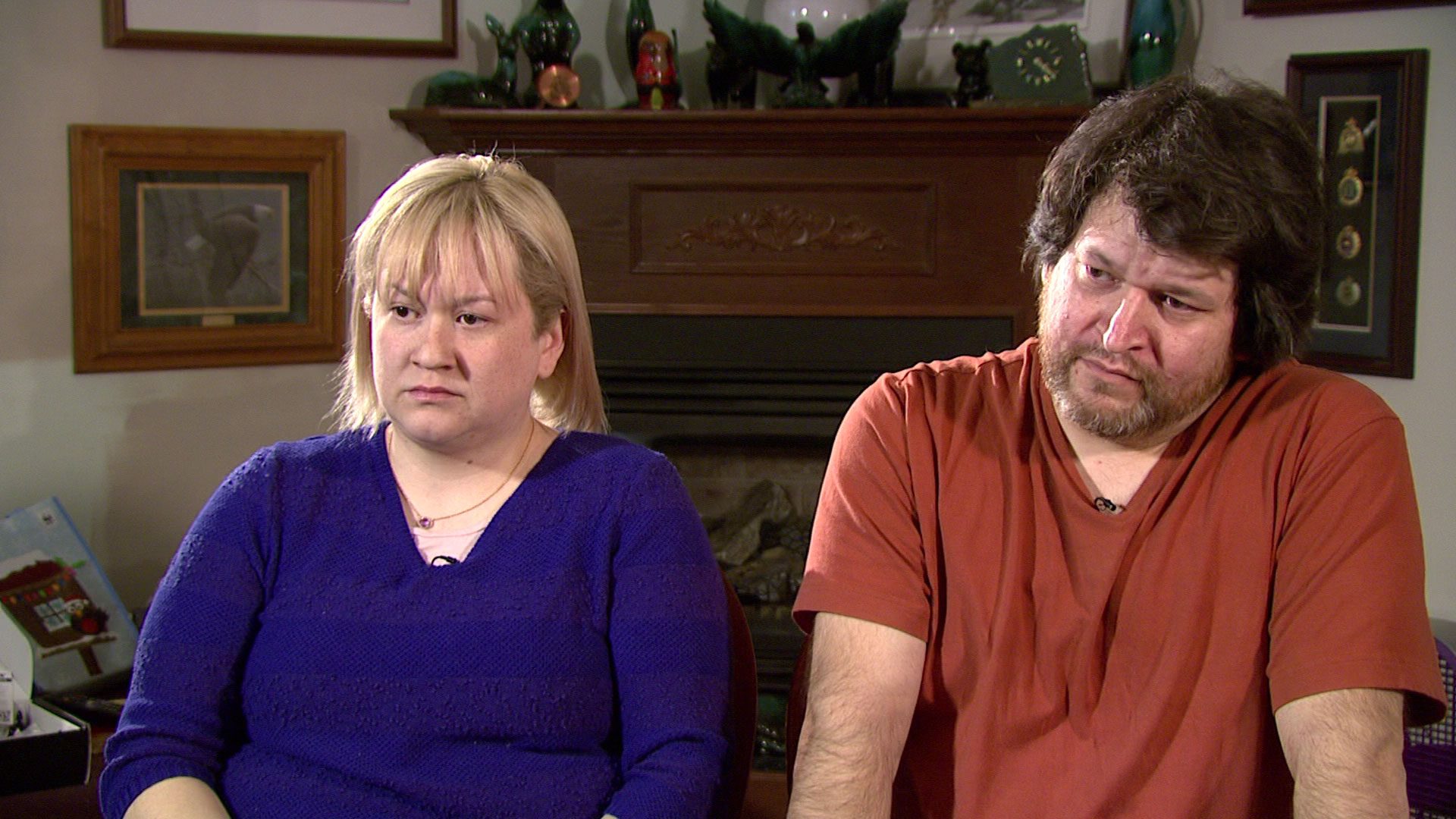
A judge ruled in 2022 that Coun. Victoria Peters, left, and Chief Norma Webb, misused band revenue after the RCMP dropped its investigation. Other judges ruled the sisters unlawfully denied membership to their family. They continue to fight Elders in court today.
The RCMP abruptly ended a nearly three year-long investigation into a band council in British Columbia after the council sued the federal police force demanding the return of its “unlawfully” obtained financial documents, court records show.
But the RCMP didn’t just drop the investigation.
It also told the three-member band council of Peters First Nation exactly who had provided the financial records, including bank statements, hoping to settle the lawsuit just 11 days after being served a notice of claim on Mar. 5, 2020.
And the RCMP did so without warning the complainants – Andrew and Lisa Genaille, the children of a fallen Mountie who died on the job in 2002.
“They turned all the evidence back over to the band council with a note that says, ‘I hope this concludes this and the RCMP file has been closed,'” said Andrew, who filed the complaint, along with his sister, Lisa, in May, 2017.
“The band council used it in court against me. They said ‘this is proof that you stole all this evidence and gave it to the RCMP.'”
Chief Norma Webb and Coun. Victoria Peters had been trying to prove Andrew had allegedly stolen documents from the band office for several years after it first filed for an injunction against him on Nov. 18, 2016.
It’s all part of a bitter feud in the small community nestled along the Fraser River about 30 km east of Chilliwack.
Two weeks before the injunction application was filed, Lisa had sent the council a letter alleging it had breached its fiduciary duty to the band in part by council members misusing band funds obtained from the expansion of the Trans Mountain pipeline.
On Dec. 9, 2016, Andrew and Lisa made it official by suing Norma, Victoria and former councillor Leanne Peters for the alleged breach.
“We knew a lot of discrepancies were happening during the Trans Mountain pipeline and so that became our main focus where, as the evidence collected, chief and council were writing blank cheques for themselves and paying themselves for meetings. You know, bonuses and everything else. That became our focus,” Andrew told APTN Investigates, in the documentary: Peters’ Indian Problem.
Read More:
‘Enough is enough:’ Court rulings stack up against band council
While the RCMP dropped its case against the council, the courts continued on with a copy of the same documents.
Following an 11-day trial in Feb., 2022, Justice Julianne Lamb ruled that the council had breached its fiduciary duty to the band.
“I find that the defendants paid themselves to attend meetings in breach of their duties from at least April 2013 until … 2019,” said Lamb.
She ordered Victoria, Norma and Leanne to pay punitive damages of $85,000 because their actions were “purposefully repugnant to the [band’s] best interests” and they were “motivated by their own self-interest.”
Lamb also ordered a disgorgement of meeting fees, honoraria and expenses they paid themselves from the pipeline money. It’s not clear, yet, how much money the council paid themselves or how much the court will order to be paid back to the band from the tally, which is ongoing.
Norma may be chief, but Lamb found that Victoria was in charge of the money.
“Victoria Peters controlled how band funds were actually disbursed,” said Lamb.
“Chief Webb demonstrated very little understanding or knowledge of program details and was often unable to explain why she was paid pursuant to various programs. I am satisfied that Chief Webb generally signed cheques as directed by Victoria Peters, and she sometimes, if not often, signed blank cheques at Victoria Peters’ request.”
Lamb found that Victoria had at least six band jobs, including health director, band manager, bookkeeper and social worker.
And she was concerned that Victoria, Norma and Leanne worked together to get their stories straight before testifying.
“The defendants repeatedly testified about what they did or observed collectively rather than recounting their personal actions or observations,” said Lamb. “I am concerned that the defendants discussed their anticipated evidence and collaborated to offer consistent stories.”
All three repeatedly claimed they couldn’t answer various questions because Andrew, or his mom, Frances, had allegedly stolen documents from the band office.
“However, Victoria Peters could not explain the lack of supporting documentation for expenditures made after Frances Genaille’s employment was terminated in December 2016: There is no reason why Frances Genaille would possess band documents created after she was no longer employed by the band,” said Lamb.
“Even before documents allegedly went missing, the defendants were not diligent about keeping supporting documents for expenses,” the judge added.
Council appealed to the British Columbia Court of Appeal, which unanimously upheld Lamb’s ruling.
“We argued on Monday and we had our ruling on Friday morning,” Andrew said.

While that case focused on the band’s own revenue, APTN also reported on the sisters’ questionable use of federal funds in 2017.
Peters’ financial ledgers revealed, among other things, large portions of federal money went to Victoria between 2013-2015.
Soon after the RCMP opened its investigation in 2017, the federal government ordered a financial review into Peters that was carried out by KPMG.
It dragged on for more than two years before also confirming what the Genaille siblings had been saying all along.
“The final report identified ineligible and unsupported expenditures,” Seamus O’Regan, former Indigenous Services minister, wrote Andrew in an Aug. 2, 2019 letter.
“The department is working with the First Nation to recover the funds.”
APTN confirmed that KPMG found nearly $370,000 in unsupported or ineligible expenditures between 2013-2015.
The KPMG financial review rolled out in stages and, early on, some sort of financial management was recommended as the report was being finalized, which sparked council to hire James Edwards, a financial consultant.
Edwards testified in the fiduciary case that when he arrived at Peters in the spring of 2019 – when the RCMP investigation was still open – there hadn’t been a council meeting in months and there was no organized filing system.
“The filing system here is a mess. We took everything from boxes of mess and then had people put them in file folders and in filing cabinets,” the court heard.
He also found that everyone went to Victoria for cheque requests.
“There were clear gaps in internal controls, clear gaps in governance practices as well as policy. There were clear gaps in terms of financial management, best practices, as well as procedures,” he testified.
He was asked to give specific examples and said there was a lack of documentation to support expense claims.
This same problem was identified during another previous financial audit conducted by MNP in 2015.
MNP uncovered that the band kept little paper trail of supporting documents for social assistance, and council members were signing cheques over to themselves, all of which MNP said opened the band to the potential for “inappropriate payments” during the fiscal year of 2014/2015.
Yet, somehow it was allowed to continue.
As the interim band manager, Edwards tried to set some boundaries and stopped paying expenses he didn’t think were right.
He testified there was a $600 request made by Victoria and another for $3,000 from Mark Peters, the nephew of Victoria and Norma, who was a long-time band employee.
“I wouldn’t sign off on those payments,” Edwards testified.
While Edwards was there, Mark was appointed as CEO to the band’s newly incorporated business, PFN 3 Feathers, that aimed to capitalize on contracts in the expansion of the Trans Mountain pipeline.
No other candidates for CEO were considered, which bothered Edwards.
“At the chief and council meeting where it was being considered I did recuse myself and left the room,” he said.
Edwards also raised concerns about Mark intending to directly award subcontracts to his personally-owned corporation.
“In my view it would be inappropriate as the CEO of the [economic development] corporation to be subcontracting to his own privately owned companies — or personally held companies,” said Edwards.

He then testified he spoke directly to Mark.
“Well, I raised my concerns — my substantive concerns — with Mark Peters, at which point I would say our relationship soured and I didn’t have any contact with him after that,” said Edwards.
The court heard that council didn’t agree to Mark’s proposal.
Council’s lawyer, Stan Ashcroft, told the court that Peters First Nation partnered with people or third parties that had Trans Mountain pipeline contracts and Peters would get a “percentage of the gross profits.”
“Are you aware that in fact the gross profit share was between three and 10 per cent?” Ashcroft asked Edwards.
Edwards replied: “I believe in my initial discussions with Mark Peters it was 10 per cent.”
“And are you aware that this process has been enormously successful and achieved over $250 million in contracts?”
“No, I’m not aware,” said Edwards, whose contract ended on Mar. 31, 2020.
That was just a couple weeks after the RCMP packed it in.
APTN asked the RCMP why it identified Andrew and Lisa to the band, but couldn’t get an answer from Staff-Sgt. Kris Clark in part because he said the notice of civil claim filed by Peters in 2020 was still open three years after it was filed.
“As the RCMP is subject to the ongoing Notice of Civil Claim and the court process, it would be inappropriate for us to comment further,” said Clark.
When pressed about it, he said: “I am not aware of the reasons why the claim has not been closed. While it remains open, we remain subject to it.”
The other reason he couldn’t speak to the letter – where the RCMP identified the Genailles – is because, he said, it’s in storage and would take several days to retrieve.
However, he was able to say “the available evidence did not support the allegation of criminality” without access to the file.
When APTN asked if the RCMP had looked over the evidence in the breach of fiduciary case to see if there was any criminality, Clark didn’t respond.
Andrew and Lisa’s father, Const. Vernon Genaille, served the Mounties for years before dying of a heart attack trying to make an arrest in 2002.
The RCMP honoured Vernon, and other fallen members, with a memorial in 2017.









